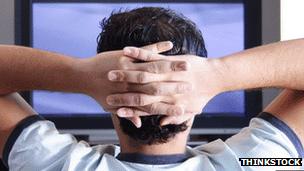Organisation launches to help combat 4G interference
- Published

Up to 900,000 households could experience interference from 4G
The organisation set up to help households experiencing interference from 4G signals has launched.
Called at800, it has been given £180m by the UK's mobile operators to ensure that next-generation services do not cause interference with TV services.
Ofcom has estimated that up to 900,000 homes could experience interference with their TV signal.
The problem affects only Freeview users, which operates close to the 800MHz frequency 4G services will use.
Live trial
According to Freeview, around 20 million households watch TV via its platform. Of these about half have it as their sole TV service.
On Monday at 800 will begin live trials in the West Midland, temporarily activating 4G masts in Cradley Heath and Rowley Regis, to gauge exactly how many households are affected and how.
A website, external and contact centre will also go live - the number is 0333 31 31 800.
Residents and business are being asked to report the extent to which Freeview services are disrupted.
Different platform
Full commercial 4G launches are expected in the summer.
The organisation plans to produce maps of households most likely to be affected and inform them via post of the things they can do to mitigate the problem.
It estimates that the majority of homes will be able to solve any interference issues by fitting a filter, which it will supply free of charge.
For vulnerable people, an engineer will visit the home to fit it.
The filter will normally plug into the aerial lead between the TV and the antenna, blocking the 4G frequencies.
For those for whom that solution does not work, an engineer will be sent out to see if they need to change their cabling or aerial.
For a few, it may be necessary to move onto a different platform, such as satellite or cable.
Simon Beresford-Wylie, at800 chief executive, said of the process: "We are hoping for the best and planning for the worst."
Other countries, where 4G services have already gone live, have had few issues.
In Germany where 10% of the population watches digital terrestrial TV, less than 10 cases of interference have been reported.
Sweden also has had very few reported problems.
- Published23 May 2012
- Published14 November 2012
- Published20 February 2013